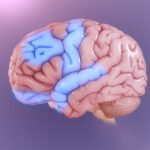
To mark OCD Week, Alexia Cowley myth-busts a condition which is often misunderstood and provides top tips for anyone experiencing Obsessive Compulsive Disorder.
I’m going to ask you to try out one thing. Don’t think of a pink elephant. I guarantee that every single reader immediately saw a pink elephant in their head, because that’s how our brains work.
You may have tried avoiding the pink elephant by thinking of something else. That’s what it’s like having Obsessive Compulsive Disorder (OCD). A thought enters your head and relentlessly plays like a broken record, over and over again.

The more you try not to think of a thought, it comes back stronger until eventually this urge can manifest into compulsions – basically rituals which (temporarily) relieve the anxiety. These can be physical or mental. But it’s a catch-22, because the more you try to avoid, suppress or replace a thought, it bounces back and you’re back at square one.
So there I am, on the edge of my bed, one dark January morning (compounded by a national lockdown). I reached a point where I just couldn’t cope with my thoughts anymore and the only viable option left was to call my doctor.

When the receptionist asked me the reason for a GP appointment, a lump in my throat emerged but I managed to mutter, “I wasn’t feeling like myself.”
Within an hour, my GP called me, asking a range of questions on my mood. I can’t tell you how nervous to the pit of my stomach I was. For a few minutes, I couldn’t speak through my tears, but she reassured me: “You’ve done the right thing asking for help. The first step is always the hardest.” And she was right.
Triple whammy
Fast-forward a few mental health assessments, I was diagnosed with OCD towards the top end of ‘severe’ on OCD, anxiety and depression. A triple whammy! On my 28th birthday, I queued in Boots to collect my first batch of antidepressants. It felt like it couldn’t get much worse - and luckily, it didn’t.
Ironically, even though I’m a trained Mental Health First Aider, I hadn’t clocked that OCD is much broader than cleaning, which just goes to show that the condition is still heavily misunderstood, even for those who experience it.
Voice for others
OCD takes many shapes and forms, so I won’t go into detail. Instead, I want to share some of my personal experiences, because I want to be a voice for others who may feel afraid to speak up about their own experience with it.
I see my OCD as separate to me. ‘Rational me’ knows that I turned my straighteners off, or locked the door, but ‘OCD me’ finds the need to do laps around the house checking and rechecking until “it feels right”.
It’s the same for driving. I’d start to actually drive around roads I’d just driven down to check I hadn’t unknowingly hit someone - because in my head, that would mean that if I did by accident, I’d lose my job and end up in prison. That’s how quickly OCD can take grip of you, spiral, and lose control.
Epiphany
The worst part is, once you feel like you’ve ‘cracked’ a theme, a new one creeps in. You wouldn’t believe how draining this is, and how much time I’ve lost worrying about something which has never happened. So when I found out I had OCD, I had an epiphany that I was, in fact, not going to be put in prison for a crime I never committed (this sounds bonkers) – but in actual fact, I was just very unwell.
To cut a long story short, I had regular Cognitive Behavioural Therapy sessions (exposure therapy) from January right through to September this year. They were intense, draining, and heavy, but they worked. I saw things through a different lens.
Top tips I learnt along the way:
▶︎ Sit through unpleasant thoughts and urges. That includes not avoiding, distracting, replacing or neutralising thoughts with ‘good’ ones.
▶︎ Don’t check. The more you check something, the worse your doubt becomes.
▶︎ Face your fears. You can do this in a safe way with your therapist. I was so scared I’d be judged but as soon as I offloaded my intrusive thoughts, I weirdly felt ‘normal’.
▶︎ Look at your core values. Why are you stuck on certain thoughts? For example, if you’re scared you’ve caused harm, it’s actually because you care and it’s the last thing you want to happen – that’s why it’s so distressing.
▶︎ Take one day at a time. This is probably the most important one, even now. OCD feels real, it’s scary and it can take hold of your mind in a very ugly way. But the good news is, if you seek help, you can get your life back on track and even live ‘OCD free.’

I’m not quite there yet, but mental health is a journey, full of real ups and downs. You can get off the OCD struggle bus with the right help, the right treatment plan and the right support and people around you.

22 comments
Comment by M posted on
Thank you Alexa for sharing your story and bringing this issue to light . I have OCD too and waiting to start my therapy (since August). I too always need to do my checks around the house to check oven is properly shut, fridge is closed ...etc. When I go away for a few days (business trip), in the first 24h , I keep checking the local news to see whether a house fire was reported as I am convinced I had forgotten the oven on...etc. All this was managable for me until one day OCD turned up at work! I am a researcher and publishes studies using quantitative data. I now spend hours checking and checking again and again all my papers thinking I certainly made a calculation mistake which will makes me lose my job. OCD is ruining a career I loved ....for me now work is all about anxiety and panic attacks ...anyway....thank you again for sharing your experience.....it gives me hope 🙂
Comment by Deborah Sally Harrison posted on
This is a fabulous story, so thanks for writing it, Alexia.
I also had OCD, but it was the sort that it was overcome very easily with anti anxiety medication.
I am getting over it slowly but I know that it is going and I don't have to worry anymore. Please do get a head on blowing it away, as it is becoming irritating to handle. Thanks,
Deborah
Comment by Rich Denny posted on
A powerful and insightful story. Thank you for sharing Alexia.
Comment by David Owen posted on
Sometimes OCD can have a physiological/biochemical background which can be greatly alleviated by large quantities of B vitamins (particularly Niacin/Niacinamide). Magnesium baths (Mag Chloride, Dead Sea Salt or Epsom Salts) can also help, as can a Ketogenic Diet.
Comment by Terry Loughrey posted on
Thank you for sharing your story Alexia. This has made me think about how I support a family member with similar experiences who regularly offloads anxious thoughts to me but who has not as yet been diagnosed with OCD - It has made me realise what I do well (listen) and not so well (give unhelpful advice like "think about something else") So pleased you benefitted from therapy, and thank you for helping me develop greater insight.
Comment by John Murphy posted on
Clear, honest and practical - thank you for sharing Alex
Comment by Alexandra Collins posted on
Great to hear your experiences Alexia, and whilst I'm sorry to hear you've been unwell I am also delighted that you could seek help and start your recovery. It's really warming to hear people being brave and talk about their own experiences, as by us all doing so it will help break down the stigma and make it normal to have periods of not being ok. In the end, that can only be positive and help those suffering to know there is light at the end of the tunnel (which is NOT the oncoming train!). This too shall pass.... 🙂
Comment by Andrew Brasnett posted on
Thanks for sharing this Alexia. Completely agree with Gavin's comment above. Best wishes for your recovery.
Comment by Garnet posted on
This is a really insightful and interesting piece Alexia. Thank you for sharing 🙂
Comment by Alexia posted on
Katy, so grateful for you always, no matter how far away we are or how long it has been! Thank you for always being so non judgemental. Sending all the love and positive vibes your way, and always just a call or message away. X
Comment by katy bird posted on
I´m so so proud of you lex. You are so brave and intuitive, you knew what you had to do. If you ever need to talk to someone you know where I am.
Comment by Helen Feather posted on
Thank you for sharing this with us. Really enlightening.
Comment by Alexia posted on
Thanks lots Heather!
Comment by Nathan Phillips posted on
Alexia you are a star and Im so glad to hear you have found your way of understanding and addressing this condition; and being so courageous to share your story. I hope this keeps getting better.
Comment by Alexia posted on
Hey Nathan you superhero! Thanks so much for your support and I miss your energy. I hope you are keeping healthy and well 🙂
Comment by Jonathan Davies posted on
Fab to see this reaching a broader audience.
Comment by Alexia posted on
Thanks so much for reading this.
Comment by Kenn Palmer posted on
Thank you Alexia, I appreciate that a colleague has written about OCD. Thoughts like the ones you describe, and the 'laps of the house just to make sure' can stem from non-diagnosed periods of self-doubt and 'not myself-ness' for anyone. I can benefit from your top tips and I'm going to share the link to your blog with some colleagues for their interest.
Comment by Vaughan Robbins (Natural England) posted on
Good article.
Comment by Alexia posted on
Thank you for reading this it's much appreciated!
Comment by Gavin Thomas posted on
Thank you Alexia for sharing with us your personal journey, and for speaking out about a condition that it is clearly not well understood.
I am really glad to hear that you were able to reach out for help, and that you have been able to find a strategy that enables you to manage your condition and continue to enjoy life.
It is only through the courage of colleagues like you speak out so openly about their lived in experience with a mental health condition, can we look to break the stigma, educate and increase awareness, and hopefully inspire others to seek support and not simply suffer in silence.
Comment by Alexia posted on
Thanks ever so much Gavin got all of your support and guidance this year, couldn't agree with you more!